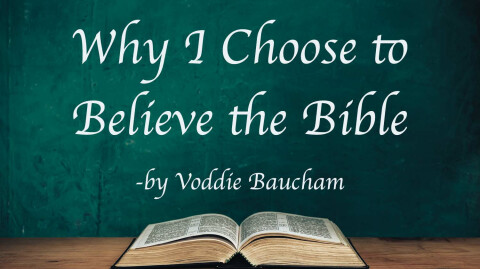Children in Old Testament Gatherings
Another major problem with the Nehemiah’s Nursery argument is that it is inconsistent with what we see in other Old Testament passages. For example, Deuteronomy 31 paints quite a different picture than the one suggested by nursery advocates:
“Assemble the people, men, women, and little ones, and the sojourner within your towns, that they may hear and learn to fear the LORD your God, and be careful to do all the words of this law, and that their children, who have not known it, may hear and learn to fear the LORD your God, as long as you live in the land that you are going over the Jordan to possess.”” (Deuteronomy 31:12-13 ESV)
Remember, we do not have explicit instructions in Nehemiah 8 regarding the absence of children. This is an assumption read into the text. If children being absent from the worship of God’s people were to be understood as normative, one would expect to see the same pattern during assemblies in Moses’ day.
Not only do we see children in the assembly in Moses’ day, we also see them in Nehemiah’s day. In fact, in the book immediately preceding Nehemiah –the book often coupled with Nehemiah—we find a very different scene than that which nursery proponents describe:
“While Ezra prayed and made confession, weeping and casting himself down before the house of God, a very great assembly of men, women, and children, gathered to him out of Israel, for the people wept bitterly.” (Ezra 10:1 ESV)
How can one argue that Nehemiah gives us a normative principle calling for children to be secluded in the nursery during worship when Ezra gives contradictory evidence? Was Ezra in violation of Nehemiah’s Nursery principle? Are there certain assemblies where children are allowed and others where they are not? Or have we simply read something into Nehemiah 8 that was never there?
Children in New Testament Gatherings
As stated earlier, even if Nehemiah had expressly forbidden children from participating in the general assembly, there would still need to be more than that in order to suggest a normative principle. Narrative is not normative; Scripture interprets Scripture; clear texts interpret obscure or confusing ones. Where is the didactic teaching that promotes the segregation of children? It is simply not there. Children were present in Old Testament assemblies. Moreover, children are also prevalent in New Testament worship. There are many instances in the New Testament where the presence of children is either stated or implied.
Children In the Ministry of Jesus
The ministry of Jesus offers some insight into the disposition our Lord had towards the presence of children in the assembly. Jesus often used Children in illustrations. Sometimes, he used them as real-life object lessons. For instance, in Matthew’s gospel we read:
“At that time the disciples came to Jesus, saying, “Who is the greatest in the kingdom of heaven?” And calling to him a child, he put him in the midst of them and said, “Truly, I say to you, unless you turn and become like children, you will never enter the kingdom of heaven. Whoever humbles himself like this child is the greatest in the kingdom of heaven.” (Matthew 18:1-4; cf. Mk 9:36-37)
This is similar to an encounter in Matthew 19:
“Then children were brought to him that he might lay his hands on them and pray. The disciples rebuked the people, but Jesus said, “Let the little children come to me and do not hinder them, for to such belongs the kingdom of heaven.” And he laid his hands on them and went away.” (Matthew 19:13-15)
In both instances, Jesus acknowledges the presence of children. Moreover, Jesus does not give any indication that the presence of the children is in any way inappropriate in either instance. Evidently, our Lord did not think children made listening to his sermons too difficult, nor did he think teaching children to behave in the assembly was too harsh, or unreasonable. Far from supporting the Nehemiah’s Nursery idea, these passages seem to refute the concept directly.
Children in the Assembly for Public Reading
Another, more subtle, piece of evidence to support children in the assembly is found in the epistles. While there is no didactic teaching in the epistles concerning children in the assembly, there are hints. For instance, Paul addresses children directly in at least two of his epistles. He writes:
“Children, obey your parents in the Lord, for this is right. “Honor your father and mother” (this is the first commandment with a promise), “that it may go well with you and that you may live long in the land.”” (Ephesians 6:1-3; cf. Col. 3:20)
The question, of course, is why would Paul address children directly in documents that would be read aloud in the public gathering unless he expected children to be present?
Conclusion
I agree with the proponents of the “Nehemiah’s Nursery” argument in the sense that I believe we should look to Scripture as our final authority for faith and practice. I applaud those who buck the modern antinomian trend and attempt to wrestle with the text instead of going with the cultural flow on such matters. Unfortunately, in this case, the text has been stretched beyond credulity. Nehemiah does not say that children were absent from the assembly. And even if that’s what he meant, he does not say that the children were in a nursery. Moreover, Nehemiah’s language would tend to exclude groups of people (the ignorant, mentally handicapped, the foreigner, etc.) that no church would be willing to isolate in a nursery.
Beyond all of this, other Old Testament texts –including Ezra 10—point to assemblies that included children. The New Testament also contains similar examples. Therefore, the “Nehemiah’s Nursery” reading of the passage in question simply will not suffice. I am not arguing that a church has left orthodox Christianity if they have a nursery. I am, however, arguing that such a decision would have to be based on something other than the eighth chapter of the book of Nehemiah. As we say here in Texas, “That dog won’t hunt.”
VB



